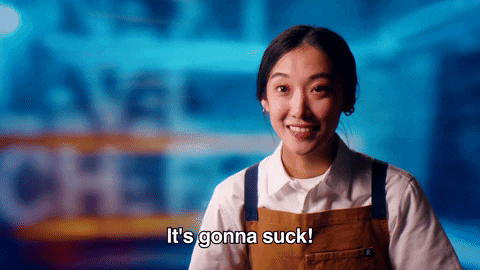Hi, I’m Kate. Ask an Author is a reader-supported newsletter providing advice and support for authors at all stages of writing, publishing, and hand-wringing. If you know someone this applies to, you can forward them this email and encourage them to sign up. Have a question? Fill out this form and I’ll answer it in a future response.
NEWS & UPDATES:
My short story “Care and Feeding” is out in The Rumpus. (content note: law enforcement, mental health, description of violence)
And a NEW short story, “Good Dead Girls,” is now out in No Tokens! (content note: sexual assault)
GREENWICH has a draft cover and a pub date! AHHHH! I can’t wait to share more details with you all!!!
Dear Kate,
I’m going out on submission with my first novel and am, uh, kind of freaking out about it. I’ve heard so many stories, from people who get huge overnight details to people who spend months and months hearing nothing, only to have their book die on sub. I’ve worked so hard on this for so many years, finally getting an agent after other novels failed to get there. I’m not sure I can take any more rejection at this point! I know that’s part of the game, but I guess I’m asking — what is this process like? What should I expect? How can I stay sane while all this is unfolding? What do I do if it doesn’t go well? Honestly it feels even worse than querying, because there are fewer places to submit it and the stakes are so much higher.
- Biting My Nails
Dear Biting [Your] Nails,
First: Congratulations! This is a huge milestone and I hope you can enjoy and celebrate the accomplishment! You wrote a novel. You finished a novel! You revised it and queried and signed with an agent and (presumably) revised it even more, and now you’re taking the next step and sharing it with editors. It can feel when querying like getting an agent is the end of a stressful and often demoralizing process, only to look up and discover it’s just the beginning — like climbing a mountain and thinking you’ve reached the top, only to see the trail keeps going (and going) (and going).
It can helpful to hear from other people what their submissions process is like, but at the end of the day, everyone’s journey is their own and no two authors are going to have the same process. Someone will have a quick sale and someone will take much longer and someone’s first book will get picked up and someone else won’t get that yes until the second, third, or even fourth book (or more). There’s no rhyme or reason or logic or fairness here. As with querying, the only thing you can summarize about the process is that it’s different for everyone, and the fact that someone had X experience has no bearing on what your experience will be. This makes it hard because there’s truly no “here’s the right way to do it” or “here’s what it’s going to be like.” The manuscript is quite literally out of your hands, and no amount of knowledge or research is going to give you control over this stage.
But this is maybe, hopefully, liberating? A little bit? You’ve done all that you can, and now you can put it aside, reconnect with the rest of your life, and trust that you’ve done your best. You’ll do something when there’s something to be done. Until that times comes and you’re in a position to revise, or resubmit, or do another round of submissions, or shelve the book, or celebrate — fretting won’t make the time pass any faster. I have a tendency to stress and catastrophize about all the possible worst-case scenarios. But someone else’s horror story is not YOUR horror story. You and your agent always have the opportunity to work together to come up with the strategies and approaches that will work best for your unique circumstances and your unique work. And what if something good happens, and imagining every bad outcome wasn’t actually necessary or the very best use of your time and energy with this one wild, precious life you have????
That being said — rejection is hard and I have to say right off the bat that yes, you need to be prepared for more of it. It’s unlikely that the very first thing you hear back from your very first editor will be a yes (in part because it’s easier to say no, so those tend to come in faster!). Different genres have different numbers of editors available and different norms about how many imprints it’s typical to approach at one time. You may be doing a small round of initial editors to gauge interest, so that you can revise and send out to more editors if necessary. You may be doing a larger first round so that if there’s a yes in there, you haven’t left editors out of the process. No matter your approach, the reality is that you’re going to get more no’s than yes’s. Picture a dream scenario, where a book sells in an incredible eight-house auction for millions of dollars. (!!!!!!) That manuscript could have gone out to 20 or 30 imprints — so even in that struck-by-lightning incredible auction, that’s still a LOT of editors who’ve said no. Just like when querying, more people are going to pass on your manuscript than are going to make an offer. It’s not because your book isn’t amazing or won’t get picked up or won’t sell well or isn’t ready yet!! It’s purely the nature of the business.
One thing you can do to help yourself is to decide how you’d like to find out about your passes. The great thing about having an agent is that they get to be a buffer between you and the publishers. Unlike querying, where you have to manage everything yourself, your agent is now doing that work and can give you news however you want it. Do you want to hear about passes as they come in? Do you want to get a weekly, biweekly, or monthly update from your agent? Do you want to only hear good or actionable news, and skip hearing all the rejections?
I used to ask for All The Updates, because I couldn’t imagine the agony of not knowing. But I’ve completely changed my mind and am now a huge advocate for only getting actionable news from your agent. I don’t need to read the pass notes as they come in. There’s nothing I can do about hearing that an editor loves my writing and couldn’t put my book down and sent it out for second reads but ultimately is stepping aside. There’s nothing I can do about an editor who doesn’t like the narrator or doesn’t have “an editorial vision” — what am I supposed to with notes like that?! I still talked to my agent and kept in regular contact when I was on sub, and I knew that if I wanted an update, I could always reach out. But there was no benefit to having passes tank my whole day. Of course there’s nothing you can do about the fact of the bad news, but I was only able to start writing a new book when I put a little distance between me and what editors were saying .
Because the main thing for you to do right now is work on something else. I know it’s hard! And maybe you need a mental break right now, which is 1,000% fine and good, too! But what you don’t want to do is let your life and your writing grind to a halt while you’re on sub, because while it could only be a week or two, it could realistically be months or even more than a year, and you don’t want to be miserable during that whole time. And if you do sell this book, honestly it’s still hard and there are more joys but also more disappointments down the road (sales! blurbs! marketing!) and the more practice you have at compartmentalizing and dealing with the bad news without letting it overtake you, the better you’ll be able to weather the additional ups and downs that are still coming. Feel the heartache, of course. And feel the wins and the excitement. But I think it’s important to maintain something of an even keel, and not be bounced around from dopamine hit to crushing defeat every time something good or bad comes your way.
The reality, too, is that if you don’t sell this book you’ll want to try to sell another. And if you do sell this book… you’ll also want to try to sell another! Just like when you were querying, and it took a few tries to connect the right agent with the right manuscript — it really helps to have a new project, no matter what the outcome is. It’s not like you can just snap your fingers and start a new book, of course. But the best way to stay sane during submission is to kind of forget it’s happening, and find something new to invest in.
I know it can feel like being on sub is worse than querying, but I’m not sure it’s helpful to compare the two. There are challenges to both, and whatever you’re going through is going to feel larger because you’re in it. I’m sure that querying felt insurmountable when you were in the thick of it, and you probably envied the people who were stressing about being on sub! Querying is hard because there’s no one in your corner, and when things don’t land, you have very little to go on and no one to work with. When you have an agent, you have someone in the industry to help guide your career, talk through ideas, and work with you no matter what news you get. Submissions is a unique challenge because there are fewer people to submit to, and a lot more people are involved in the process. An agent can make their own independent decision, but an editor generally needs buy-in from a whole department, as well as from sales. The stakes are, in some ways, higher. But I hope you can appreciate the success you’ve already had — and the yeses you’ve already gotten! — and remember that a no from an editor isn’t the end of the book, and even a no from everyone in this round doesn’t mean the manuscript is “dead” or that your career is over. It’s cheesy but true: the people who get published are the ones who kept writing, kept submitting, and didn’t give up.
Everything you write will make you a better writer by virtue of having written it. And the only way to get something published is to write it first. Things might be hard on sub, and I think it’s good to prepare yourself so you’re not left crushed if you don’t get a massive deal in a matter of days. But that doesn’t mean you have to anticipate every possible thing that could go wrong. Because what if things go right? It’s a lot of energy to sink into worst case scenarios that haven’t even happened yet. All you can really do right now is trust your writing, trust your agent, love the work you’ve done, and love the work you still have yet to realize.
Keep going!
Kate



